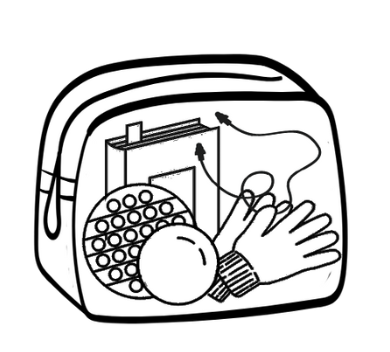Pro Tips Home
Download the .pdf guide
Social Boundaries: Friends and Family
Events with friends and family can be difficult for anyone, but being autistic can make these situations feel especially difficult. These times can often bring us closer, but they can also bring stress, arguments, and other difficult social interactions to navigate. We can make it a little easier by setting boundaries and intentions in advance.
- Before it begins...
-
Set your priorities: What do you want to get out of this event or gathering?
Peaceful time with family? Building Relationships? Trying something new?
-
Remind yourself of these priorities throughout these occasions. We all have limited energy; decide where to best use that energy.
-
Think about what relationships or interactions you want to prioritize. You don’t owe everyone your time, response, and energy by default.
Set your boundaries: Decide what you won’t tolerate, or what you need to avoid during these events.

-
You can set social limits.
-
Examples: Avoiding political arguments? Avoid upsetting topics?
-
-
You can set sensory limits.
-
Examples: Avoiding loud spaces? Using ear plugs?
-
-
You can set plan and time limits.
-
Examples: Not going to certain events? Leaving by a certain time?
-
Think about accommodations: Things you do for yourself, things you need from others, and how to make it all go smoothly.
-
Do you need to prepare for practical needs?
-
Example: Having ear plugs on hand
-
-
Do you want or need to communicate those with friends and family?
-
Example: Can someone else help support you?
-
-
- Preparing for your needs
-
Have sensory tools that you need.

-
Prepare a little pack with sensory items.
-
Example items: ear plugs, gloves, mask.
-
This could also include comfort items, fidget items, or something that helps you calm down, like a book or game.
-
Plan how you will respond to becoming overwhelmed.
-
Have a safe place you can go to take the time you need, and know where this is before the event begins.
-
Example: a room, a bathroom, outside.
Try to make a plan with a person you can trust in advance
-
Example: Have a safe word so they can help redirect the conversation, or cover you when you take a break.
-
Example: You could text someone privately during an event for mutual support.
-
- Communicating
-
When communicating your needs and boundaries with others:

-
Use clear language, and be direct.
-
Example: “If things become too loud, I may go to my room and take a break.”
-
-
Avoid confrontational language:
-
Example: “You need to stop trying to start an argument.”
-
Another Option: “I’m not comfortable talking about this right now, let’s talk about something else.”
-
-
Let people know what will happen in certain situations, such as if your boundary is crossed, or if you become overwhelmed.
-
Example: You may step away or go to a private spot.
-
-
It’s okay to respond later. You don’t need to always respond in the moment, especially when energy is limited or an event is overwhelming. It can be better to address issues with others in a private, less overwhelming situation regardless.
-
Before you agree to something, remind yourself of your own plans, needs, and boundaries. Be willing to say "no" when you need to.
-
Sometimes you need to navigate around difficult people that won’t respond to needs, regardless of how well you communicate them. Remember that this isn’t your fault, and you can only control how your own responses in these situations.
-
- Practicing mindfulness and self care
-
Focus on here and now throughout the event or during interactions with family. This is very literal, it can help to focus on the world around you.

Do your best to stay aware of your own experiences. Frequently check in with yourself about:
-
Your emotional level. Instead of trying to specifically name or judge your feelings as good or bad, focus on intensity. Use healthy responses to intense emotions, like physical movement, using stims, or taking a moment to yourself.
-
Your sensory experiences. Think about your environment. Are sensory experiences causing you stress, and is there some way you can reduce that? Sometimes, even things we aren’t consciously aware of can effect us.
-
Your health. Pay attention to your physical needs, like sleep, hunger, and thirst.
Make adjustments where you can, take the time you need, and don’t just accept tolerating things you can change.
-
- Responding to difficult situations
-
Always remember that you have options.

We can feel trapped into conversations when others start them. Base the way you respond on your priorities and needs right now.
Reminders
- You can talk about it later.
- Some people will never change their mind.
- You have limited energy, is responding worth the cost?
______________________________________________________________________________________
Here are a few examples of difficult interactions and how you might respond.
Remember that everyone and every situation is unique.
Someone becomes frustrated, angry, or worried when you need to leave the room... “I may go take a break. Everything is okay, I just need time.” Someone feels that you are being rude and ignoring them when you use ear plugs... “I will be wearing ear plugs, but I can still hear you. I am not trying to ignore you.” Someone is pressuring you, or being hurt if you set limits... “Thank you for wanting me there, but I’m not comfortable doing that right now.” Someone deliberately talks about something you ask them not to... “I don’t want to talk about that right now. If you continue, I will have to step out for a minute.” Someone makes an insulting, offensive, or off-the-cuff comment... “That was a strange thing to say.”
